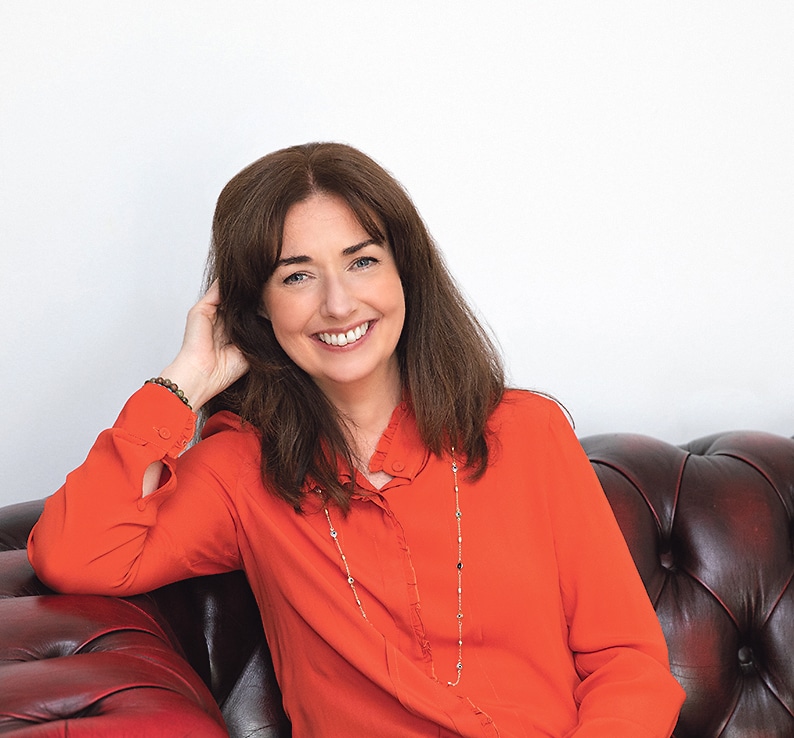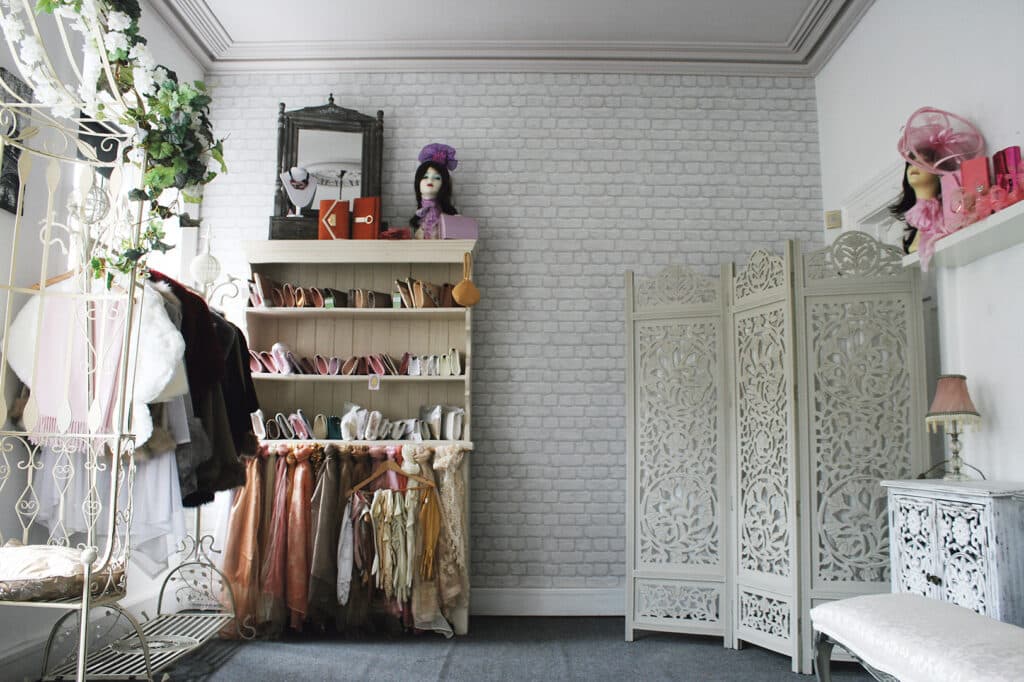According to research carried out by Menopause Workplace Consultant Catherine O’Keeffe ‘almost one in three women were considering giving up their job due to menopause’. While honest conversation has only very recently really opened up in society around menopause, Catherine has been educating and informing in the workplace for almost five years. Founder of Wellness Warrior, and creator of the Menopause Success Summit, she has helped over 150 companies choose support over silence when it comes to women’s health: Her mission from the start has been to shatter the menopause taboo…for good!

Catherine’s personal menopause journey started at the age of 44 when she started experiencing some symptoms of perimenopause, flooding (very heavy periods), mood swings, anxiety and bloating. Following a presentation at work, where brain fog, memory loss and anxiety left her floored, the investment banker realised that she needed to work with and not fight against the change she was experiencing.
Catherine believes that menopause should be a rewarding and empowering stage in a woman’s life. ‘It changed my life,” she shares. “Menopause offers the opportunity to look at where you’re at in life and assess and prepare for the years ahead.”
Catherine left investment banking behind and went on to become the founder of Wellness Warrior. Over the years she has researched every aspect of menopause and health and has discovered many natural solutions that are providing relief to women both in perimenopause and menopause.
Perimenopause can start several years before menopause when a woman’s ovaries naturally start producing less oestrogen and is an inevitable rollercoaster of hormonal upheaval for many women. The ensuing ever-changing symptoms means that you have to adapt and change as you go through these years.
“The changes that happen in menopause will be unique to everyone,” says Catherine, sharing the four pillars that helped on her journey.
1. Find your passion: Catherine now works every day with people and workplaces educating and empowering them with fact-based information on menopause.
2. Deepen your Education: Catherine armed herself with as much information as possible to understand the many choices available, from HRT to alternative choices to lifestyle. “Find trusted resources and when you do take one piece of information at a time, avoiding overwhelm.”
3. Get Support: Catherine found her tribe who support her every day. “Menopause conversation should not be one of embarrassment or shame, it’s a natural process.It’s really important to be open about what you’re experiencing with family, work colleagues, friends, your GP – build your tribe around you. Having this support will help you with number 4.”
4. Letting Go: When one door closes, another opens. “To quote Dr Maureen Gaffney, ‘we have to go back in order to go forward’. If we flow with these changes, as opposed to going against the tide, this becomes an easier journey. Self-compassion, empathy and kindness to yourself is important as you go through these years.”
“This time of life should be about good food, deep sleeps, plenty of exercise, support and lots of laughter. If we embrace the four pillars listed above, it can bring us to a place where we can look forward to the days ahead.”
Without a good night’s sleep however everything becomes more difficult and reaching even simple goals can feel impossible.
“Sleep is the bedrock of thriving through menopause,” acknowledges Catherine. “If you can get that right, you can handle anything.”
Sleeping difficulties are common in menopause due to fluctuating and decreasing hormones.
“What will deplete your hormones further is ongoing cortisol production from ongoing chronic stress,” says Catherine. Cortisol is our primary fight-or-flight hormone.
“If you’re stressed you won’t sleep properly, then you won’t have the energy to exercise or eat properly – it becomes a catch-22!”
When melatonin is high, cortisol should be low and vice versa. When either of these gets out of balance, our ability to sleep is affected. Our bodies normally produce cortisol in a cycle – more when we wake, less near bedtime. Levels should naturally decline as levels of the hormone melatonin rise to induce sleep. But when cortisol levels become higher or lower than normal for prolonged periods, our wellbeing can be compromised.
Studies have shown that even having your phone in sight or nearby can elevate cortisol levels.
“Ideally don’t bring your phone or TV into the bedroom,” says Catherine.
Catherine goes to bed now most nights at 9.30pm, reads a book, fills in her gratitude journals and turns off the light around 10, usually a bit later at the weekend. “We know that ongoing sleep and stress issues are triggers for Alzheimer’s and dementia, it’s not just because you’re in menopause,” she stresses.
She recommends the supplement Mag365 and Tulsi Clarity tea to help with sleep issues.
“HRT is not a get-out-of-jail card – it’s there to help you manage the symptoms of menopause as you transition through these years. You still need to make lifestyle choices for the benefit of your longterm health.
Exercise is a huge part of Catherine’s personal tool kit.
“I’ve read so many research papers and everything comes back to exercise,” she shares. “it helps with vasomotor symptoms (night sweats, hot flushes), anxiety, brain fog, you name it. You don’t have to go hell for leather or become superwoman, you just need to make sure you have as much movement in your daily life as possible.
Catherine recommends cardiovascular exercise like running or brisk walking for heart health but also strengthening exercises. “Whether it’s lifting bags of sugar at home or going to the gym, this is what will keep us from weak bones and hip fractures. Weights are a big part of building on your bone mass but start off easy and don’t injure yourself.”
Anything that exacerbates your symptoms, like alcohol, smoking, caffeine or sugar is not your friend. A varied and healthy diet will help you on this journey. “Fibre, protein, nuts and seeds, lots of water…look after your gut with as much variety in your diet as possible,” says Catherine.
Her go-to supplements for helping with symptoms are Omega 7 for vaginal dryness, Maca for hot flushes and night sweats, Vitamin C for so many things (Catherine recommends Somega) and Vitamin D for bone health. It’s also important not to get overwhelmed with the supplement choice out there. Find out what you need and don’t go overboard.
“Get your tribe around you…a good GP, pharmacist, osteopath and so on…and menopause can be one of the most empowering times of a woman’s life.”
Now age 51, Catherine is at the top of the perimenopause mountain and is feeling pretty good, which she attributes to her lifestyle. “The early years were the hardest,” she shares.
She’s not on HRT. “Right now I don’t need it but that might change in a year’s time,” she admits.
Hormone replacement therapy (HRT) replaces hormones that are at a lower level as you approach the menopause, relieving symptoms.
“I’ve been in rooms with women who have cried with me because they feel they’re missing out as they can’t take HRT. But HRT is not for everybody, especially for women who are contraindicated or just don’t do well on it. It can be a lifesaver for many women but the end goal is not that every woman should be on HRT.
“We need to be calm and balanced in this conversation and part of being balanced is respecting the individual woman and her choices. Don’t tell me I have to do acupuncture, don’t tell me I have to take HRT. Give me the information and I’ll decide what’s best for me.
“The government is well aware of the need for a national awareness campaign for menopause,” says Catherine. “and employers are realising that they have to support this conversation because women like their careers and want to stay working.
“It costs a lot more to replace the experience and knowledge that a woman has at this stage of her life in the workplace than creating a supportive work environment. I’d love to see more awareness and education at secondary school level and in all workplaces.
“Menopause isn’t going to go away, it’s a natural stage in a woman’s life and, as women, we need to protect it so that it stays being the natural evolution that it is. We don’t want it to be viewed as a disability.
“Find out what works for you,” says Catherine, “be it acupuncture, herbs or HRT.
At the end of the day it’s your menopause and nobody understands your body better than you.
For updates on the next Menopause Summit happening on October 22 and to contact Catherine go to www.wellnesswarrior.ie.



